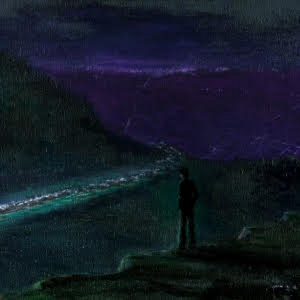Brothertiger's 'Paradise Lost' Album Out Sept. 11
What does contentment really mean to us?

What does contentment really mean to us? Is there such a thing as a perfect life, and are we wrong for constantly yearning for something more in the distance? These weighty, generational questions are put under a microscopic lens on Brothertiger's new album Paradise Lost, the latest release from Brooklyn-based, Ohio-hailing 30-year-old electronic pop musician John Jagos. A lush journey through oceanic textures and gorgeous, tactile synths, Paradise Lost charts Jagos' perspective of optimistic existentialism, his lovely cloud of a singing voice hovering over the proceedings and radiating emotional honesty.
Paradise Lost is the latest exciting chapter in Jagos' career, which began in earnest as he experimented with his own productions in college back in 2009. After uploading a few of his early creations to MySpace, he quickly attracted prominent music blog attention from outlets like Pitchfork and No Pain in Pop and found himself amidst the style of electronic pop sometimes referred to as chillwave. "The music I was already making was fitting into that vibe," he recalls.
He released two albums-2012's Golden Years and Future Splendors in 2013-on electronic label Mush, which counts Bibio and Daedelus in its stable; in 2015, Jagos went full-on independent by self-releasing his third album, Out of Touch. Since then, he's released a collection of Tears for Fears covers, Brothertiger Plays: Tears for Fears' Songs from the Big Chair, as well as last year's A Chain of Islands EP-but when it came to making his fourth full-length, Out of Touch loomed largest in his mind. "With Out of Touch I felt like I finally found the sound I was looking to achieve," he explains. "I used that album as a springboard for this new record, carrying forward that style while making the sonic landscape sound bigger."
Drawing from musical inspirations ranging from the aforementioned '80s legends Tears for Fears to Talk Talk and Prefab Sprout, Jagos has constructed a glistening melodic web across Paradise Lost's ten tracks as he waxes philosophical on his current city of residence and the shifting nature of his own expectations. "I've definitely grown a lot while being here, but it's grown a bit tiresome to me, too," he reflects while discussing the central themes of Paradise Lost. "New York City's lost a lot of its glimmer when it comes to music. It's a lot harder to make music here now, with the shutting down of DIY venues and rent increases that make it harder for artists to cultivate something. A lot of this album is about my frustrations about possibly leaving the city, as well as my yearning to escape somewhere else-if not for a brief period of time, then maybe permanently."
Over delightfully woozy synths and a pounding backbeat, "Livin'" addresses the malaise that's affected every generation-specifically, the pressure to live up to those that came before you, and the power of your own decision-making. "There's always underlying pressure to be achieving certain life goals at certain ages," Jagos explains. "The song is about doing your own thing and not worrying about how other people think you're living your life." Accompanied by the type of beacon-esque synth work that recalls iconic electronic duo Boards of Canada, Paradise Lost's title track is a melancholic reflection on what happens when we properly take in the changing world around us. "The atmosphere isn't the same that it used to be," Jagos expresses while discussing the song's lyrical bent. "When I moved here, I thought of this place as a paradise for the arts. And it's still a great place to establish a foundation, but things are harder than they used to be, which is the natural progression of human existence."
Elsewhere, the lovingly languid "My Canopy" finds Jagos reflecting on his own personal nirvana-a place in which, he explains, "I can be where I'm content with everything. The weather's always good, and I'm making all the music that I want, while not worrying about finances. It's a paradise, and it's important to find your own place that can exist in your mind." But Jagos is quick to point out that, according to the ethos he's laid out on Paradise Lost, that place may not exist anywhere else-and there's nothing wrong with that. "The place you call home is never going to be perfect, no matter how much you love it," he ruminates. "Paradise doesn't exist, and that's okay. And even though it's okay to keep searching for paradise, it's also okay to accept things the way they are."
Comments
Videos

